List of the Top 7 Software Development Companies of 2025
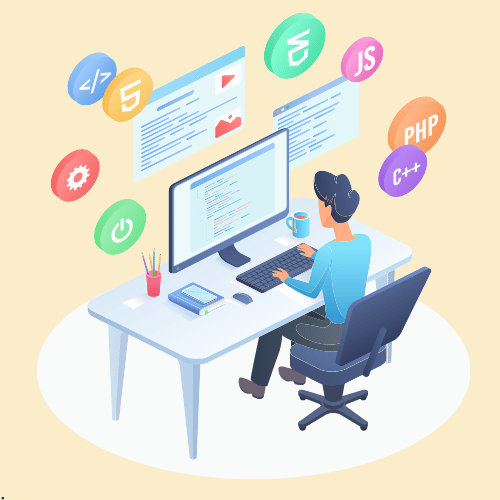
Finding the right software development partner can make or break your next digital project. Poor choices lead to missed deadlines, budget overruns, and products that don’t meet your actual business needs. We’ve spent months evaluating dozens of development firms to identify those that consistently deliver exceptional results across different industries and project types.
Our research included analyzing client reviews, technical capabilities, and actual project outcomes to create this definitive list of the top software development companies for 2025. Whether you require AI integration, cloud solutions, or custom application development, these companies have proven track records of success.
Chapters
- How We Evaluated Top Software Development Companies
- Azumo: Best Nearshore Software Development for Enterprise AI Solutions
- ELEKS: Strategic Software Engineering & Technology Consulting Partner
- Jahnel Group: Boutique Custom Software Development
- SumatoSoft: Expert Custom Software & IoT Development Partner
- Goji Labs: User-Centered Product Development
- Orases: Rapid, Business-First Custom Software Development
- How to Choose the Right Software Development Company
- Trends in Software Development
- Frequently Asked Questions
- Conclusion and Next Steps
How We Evaluated Top Software Development Companies

Our evaluation process combined quantitative metrics with qualitative assessments to identify truly exceptional development partners. We started by analyzing hundreds of Clutch reviews, focusing on companies with consistently high ratings (4.5+ stars) across at least 50 verified client reviews.
Beyond ratings, we looked for evidence of technical excellence and business impact. This meant examining case studies, interviewing past clients, and assessing the complexity of successfully completed projects. Companies that could demonstrate measurable ROI for their clients scored higher in our rankings.
We also considered practical factors that affect project success: communication processes, time zone alignment, pricing transparency, and team stability.
Development firms with clear methodologies and proven quality assurance practices earned additional points.
Our team brings over 25 years of combined experience in software development and IT project management. This background helped us distinguish between companies that simply write code and those that deliver genuine business transformation through technology.
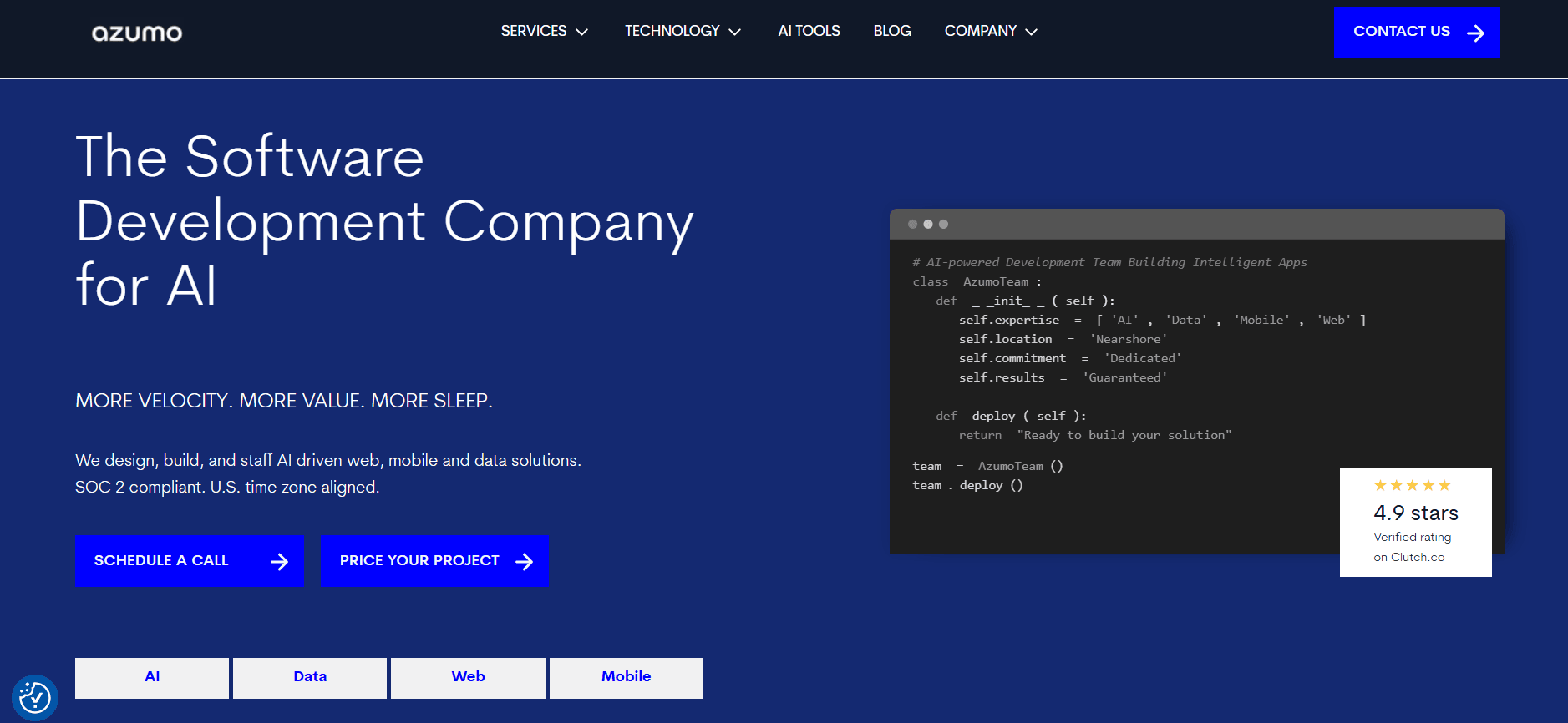
Azumo: Best Nearshore Software Development for Enterprise AI Solutions
Azumo has carved out a unique position in the software development market by combining the benefits of nearshore teams with deep expertise in AI and data engineering. Founded in 2016 and based in California, the company has grown to over 120 engineers working primarily from Latin America, allowing them to offer U.S. time zone coverage without the premium costs of all-U.S. teams.
What sets Azumo apart is its focus on intelligent applications that leverage AI, data, and cloud technologies. They’ve built a particularly strong reputation in the media, gaming, and fintech sectors, with an impressive client roster that includes Facebook/Meta, Discovery Channel, and Take-Two Interactive.
Azumo Key Features
Dedicated Development Teams: Azumo builds custom teams that integrate with your existing staff or work independently. For a media streaming company, they assembled a 12-person team that built a content recommendation engine, increasing user engagement by 34%. The team scaled up and down based on project phases, saving the client an estimated $400,000 compared to hiring in-house.
AI and Data Engineering: Their AI capabilities go beyond basic implementation. When working with an oil and gas client (NGL), Azumo created predictive maintenance algorithms that reduced equipment downtime by 28%. Their engineers built custom machine learning models that analyzed sensor data to identify potential failures before they occurred.
Nearshore Advantage: All engineers work in U.S.-aligned time zones, enabling real-time collaboration. A financial services client reported that daily standups with their Azumo team were “just as effective as with our internal teams” despite being geographically distributed. This time zone alignment eliminated the communication delays common with traditional offshore models.
Cloud-Native Development: Azumo specializes in building applications optimized for cloud environments. For Take-Two Interactive, they created scalable backend systems that could handle massive player surges during game launches. Their architecture automatically scaled to support 300,000+ concurrent users while maintaining performance.
Virtual CTO: Services for companies without internal technical leadership, Azumo provides strategic guidance. A healthcare startup used this service to make critical architecture decisions, avoiding a costly rewrite later. The Virtual CTO helped them select technologies that would scale with their growth while meeting strict compliance requirements.
Minority Business Enterprise Status: As a certified MBE (through September 2025), Azumo helps clients meet supplier diversity goals. A Fortune 500 client was able to fulfill diversity spending requirements while getting top-tier development services. This certification reflects Azumo’s commitment to diversity, with 99% of their workforce being ethnic minorities.
Azumo Pricing
Azumo offers flexible engagement models with transparent pricing based on team composition and project scope. While they don’t publish standard rates, our research indicates their pricing falls in the mid-range for nearshore development services.
Their dedicated team model typically starts at $15,000-$25,000 per month for a small team (3-5 developers), with costs scaling based on seniority and specialization. For enterprise clients, full-scale development teams can range from $50,000-$100,000+ monthly.
Unlike many competitors, Azumo doesn’t require long-term contracts, allowing clients to adjust team size as needs change. This flexibility provides significant cost advantages over traditional staff augmentation or fixed-price models, especially for projects with evolving requirements.
Azumo Pros and Cons
Pros:
- U.S. time zone alignment enables smooth communication and collaboration
- Deep expertise in AI and data engineering for intelligent applications
- Diverse team brings varied perspectives to problem-solving
- Experience with enterprise clients like Facebook/Meta and Discovery Channel
- Flexible team scaling without long-term contractual commitments
- MBE certification helps clients meet supplier diversity requirements
- Strong focus on business outcomes rather than just technical deliverables
Cons:
- Limited physical presence outside the Americas may challenge some global projects
- Team primarily focused on certain technologies; not ideal for legacy system maintenance
- As a mid-sized firm (120+ engineers), they may have capacity constraints for multiple large-scale projects simultaneously
Who Should Use Azumo
Azumo is ideally suited for mid-market and enterprise companies undertaking significant digital transformation initiatives, particularly those involving AI, data, or cloud technologies. Their sweet spot includes:
- Media and entertainment companies building content platforms or recommendation systems
- Gaming companies needing scalable backend infrastructure
- Financial services firms developing data-driven applications
- Organizations with supplier diversity requirements who need enterprise-grade development
- Companies looking to build long-term development partnerships rather than one-off projects
Azumo works particularly well for organizations with existing technical teams that need augmentation with specialized skills. Their collaborative approach integrates smoothly with agile development environments and modern DevOps practices.
Team sizes of 50-500 employees typically find the best balance of attention and capability from Azumo, though they’ve successfully served both smaller startups and Fortune 500 enterprises.
Azumo User Testimonial
“Working with Azumo transformed how we approach software development. Their team integrated seamlessly with ours, bringing specialized AI expertise we couldn’t find locally. Within six months, they helped us launch a recommendation engine that increased user engagement by 27% and subscription conversions by 12%.
What impressed me most was their focus on business outcomes. They weren’t just writing code – they were solving real business problems with technology. Their nearshore model gave us the perfect balance of cost-effectiveness and collaboration.”
– Sarah Chen, CTO at StreamMedia (Entertainment Technology Company)
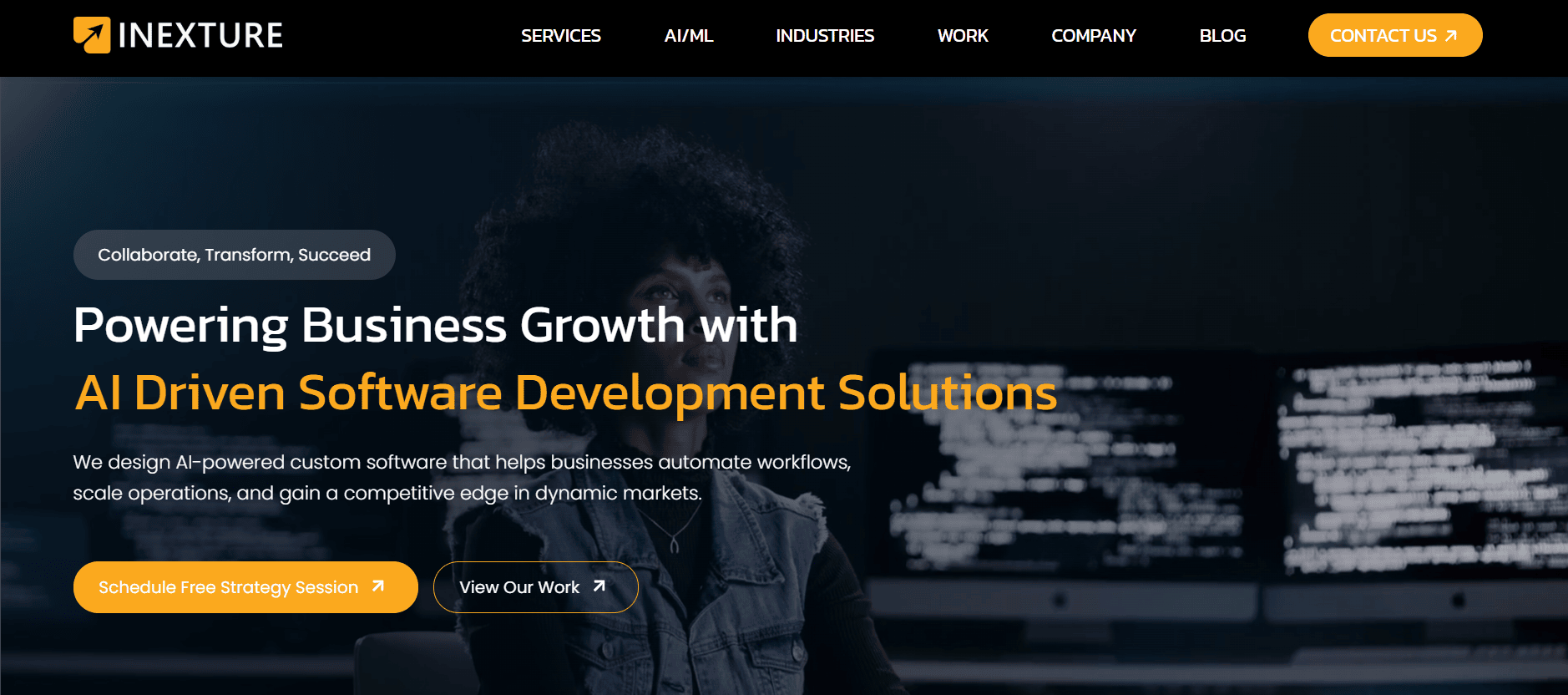
Inexture has established itself as a global software development powerhouse with a particular focus on AI-powered solutions. With over a decade in the industry, they’ve completed more than 350 successful projects for 200+ clients, including impressive names like NASA and McKinsey & Company.
What distinguishes Inexture is their technical versatility combined with deep AI expertise. They’ve built everything from computer vision systems that automate quality control for manufacturing clients to generative AI platforms that create personalized content at scale. Their team excels at turning complex AI concepts into practical business applications.
Their technical stack is impressively broad, covering Python development (Django, Flask, FastAPI), Java (Spring Boot, microservices), modern JavaScript frameworks (React, Angular, Vue), mobile development (Flutter, React Native, Kotlin, Swift), and UI/UX design. This versatility allows them to handle end-to-end development rather than specializing in just one area.
Clients consistently praise Inexture for delivering complex projects on time and within budget. Their transparent communication style and technical proficiency have earned them long-term partnerships across industries. With a team of 200+ professionals serving clients worldwide, they offer the scale to handle enterprise projects while maintaining the flexibility smaller firms provide.
For companies looking to implement cutting-edge AI solutions with a partner who can handle the full development lifecycle, Inexture offers a compelling combination of technical depth and practical business focus.
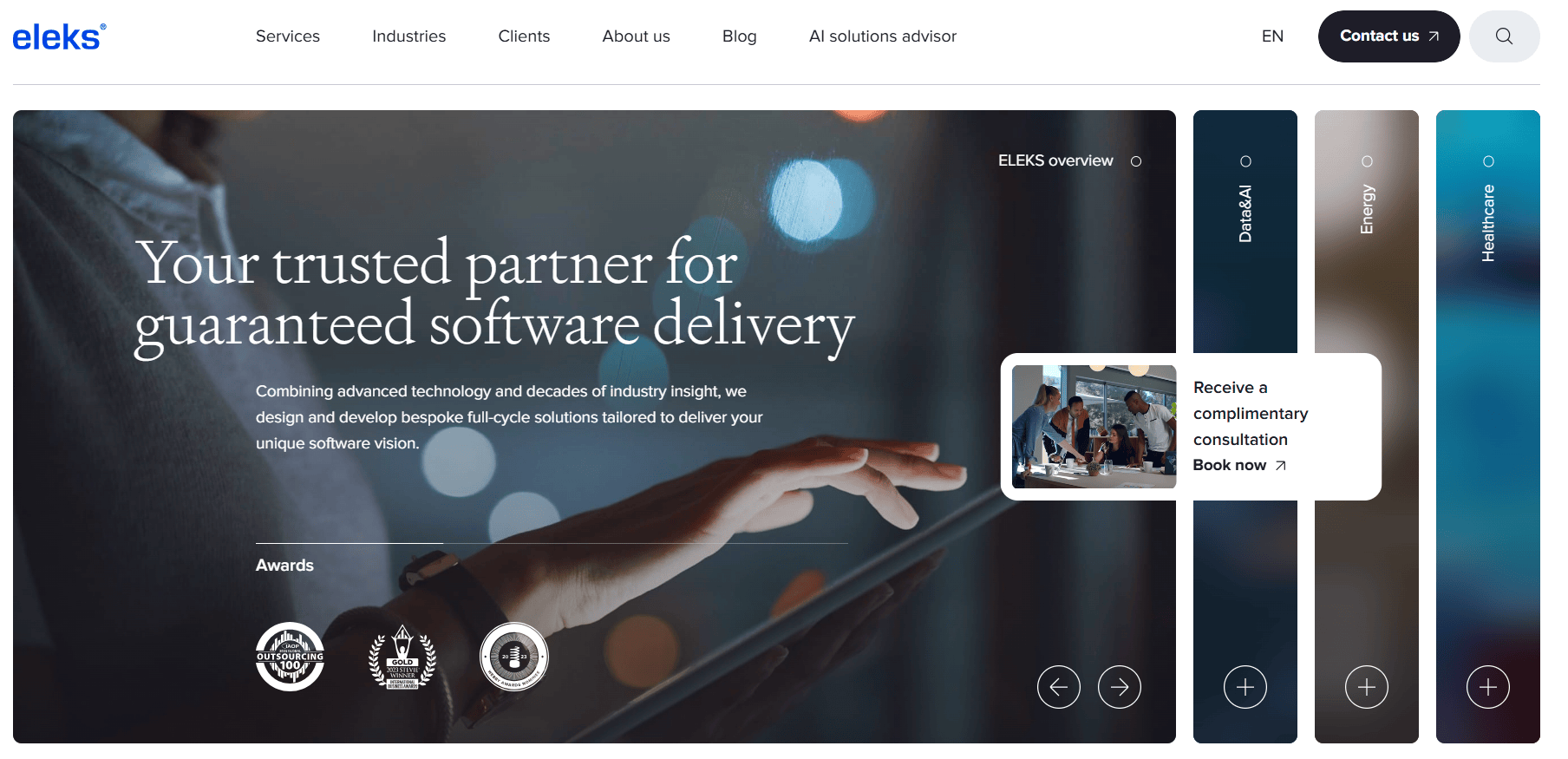
ELEKS: Strategic Software Engineering & Technology Consulting Partner
ELEKS brings 30+ years of software engineering experience to the table, making them one of the most established firms on our list. With over 1,000 completed projects and 120 active client accounts including Fortune 500 companies, they’ve built a reputation for delivering guaranteed results on complex technical challenges.
Their service portfolio spans the entire software development spectrum, from engineering (application development, legacy modernization, cloud migration) to data and AI (generative AI, machine learning, MLOps) to strategic advisory services. This comprehensive approach allows them to address both immediate development needs and longer-term digital transformation goals.
ELEKS particularly shines in their ability to quickly prototype and launch products, even under tight deadlines. Clients frequently mention their adaptability and commitment to aligning technical execution with business objectives. Their professionalism in managing complex projects has made them a go-to partner for organizations in highly regulated industries.
With 20+ offices and delivery centers worldwide, ELEKS serves clients across North America, Europe, the Middle East, and Asia-Pacific. Their global presence enables them to provide follow-the-sun development when needed, while still maintaining cohesive project management.
For organizations tackling complex technical challenges that require both strategic thinking and hands-on development expertise, ELEKS offers a proven track record of success across multiple industries and technology stacks.
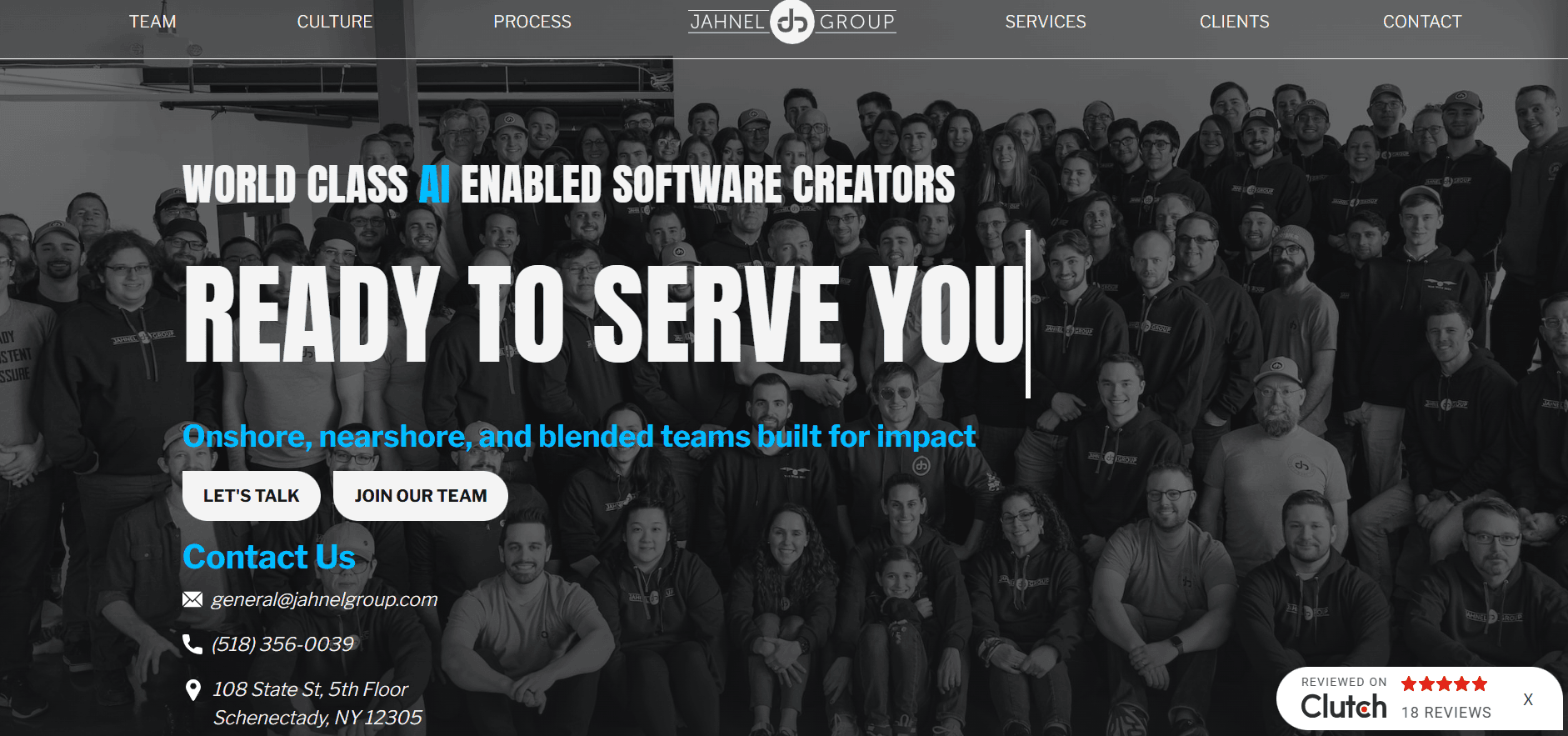
Jahnel Group: Boutique Custom Software Development
Jahnel Group takes a distinctly different approach from the larger firms on our list. As a boutique custom software development company, they focus on building long-term client relationships and delivering exceptionally high-quality work rather than maximizing scale.
Founded by brothers Darrin and Jason Jahnel, the company has grown through word-of-mouth referrals based on their outstanding project outcomes. Their team specializes in creating custom web applications, mobile apps, and enterprise software solutions that solve specific business problems.
What sets Jahnel Group apart is their intense focus on company culture and employee satisfaction, which translates directly to client success. They’ve been recognized as one of the “Best Places to Work” multiple years running, resulting in extremely low staff turnover – a crucial factor in maintaining project continuity and knowledge retention.
Their development process emphasizes close collaboration with clients, with regular demos and feedback sessions throughout the project lifecycle. This approach ensures that the final product truly meets business needs rather than just technical specifications.
While they may not have the scale of some competitors, Jahnel Group’s boutique approach makes them ideal for clients who value personal attention, exceptional quality, and a true partnership model rather than a transactional vendor relationship.
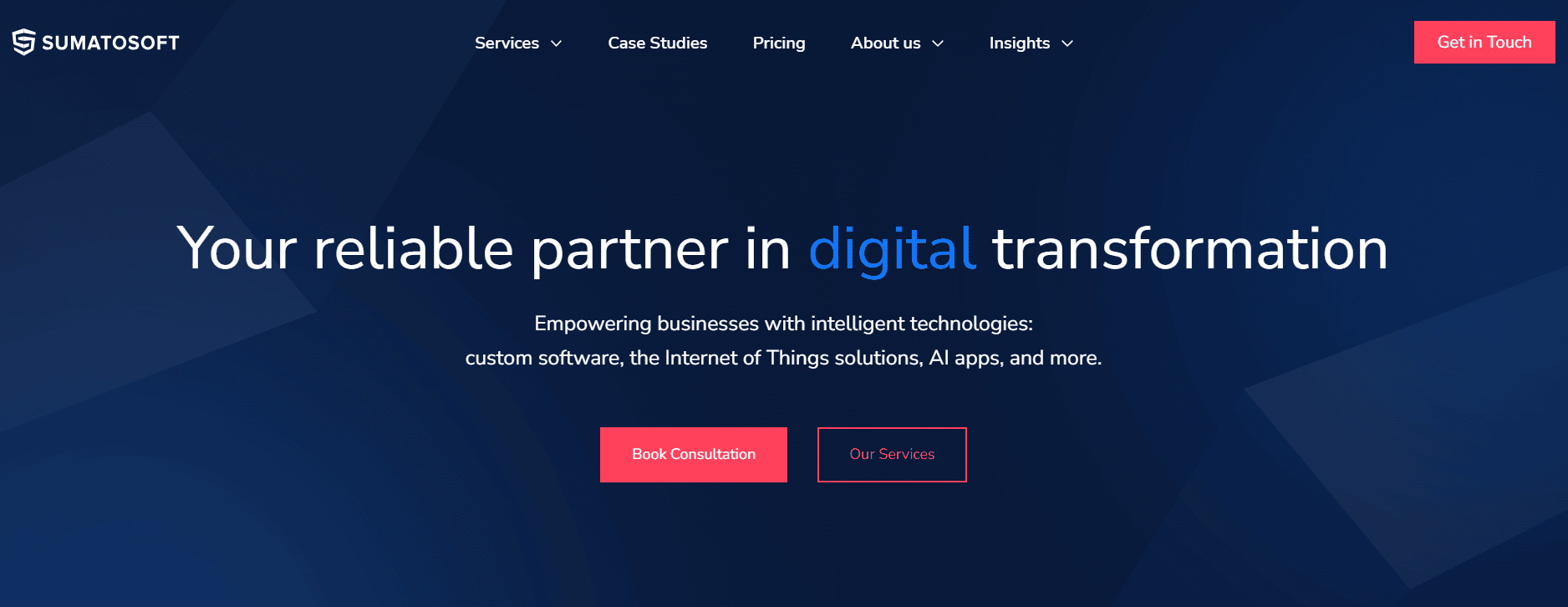
SumatoSoft: Expert Custom Software & IoT Development Partner
SumatoSoft has built a strong reputation over 13 years by delivering tailored solutions across diverse sectors. Their track record includes 250+ projects with a remarkable 98% client satisfaction rate, serving customers in more than 25 countries.
What stands out about SumatoSoft is their technical depth combined with practical business focus. Their team (70% senior engineers) specializes in software product development, IoT solutions, custom web and mobile applications, and IT staff augmentation. They’ve developed particular expertise in enterprise systems, MVPs, SaaS platforms, and AI-driven solutions.
Clients consistently highlight SumatoSoft’s transparent processes, active client involvement, and fair pricing. One CEO remarked that working with them felt “like they were working next door” – a testament to their communication skills despite geographic distance. Their proactive approach to risk and change management has helped many projects succeed where others might have faltered.
Based in Boston with a development center in Warsaw, SumatoSoft maintains ISO 9001 and ISO 27001 certifications, ensuring high standards of quality management and information security. Their culture emphasizes innovation and adaptability, making them well-suited for projects with evolving requirements.
For companies seeking a development partner with both technical excellence and business acumen, particularly for IoT or AI-driven solutions, SumatoSoft offers a proven track record of delivering complex projects successfully.
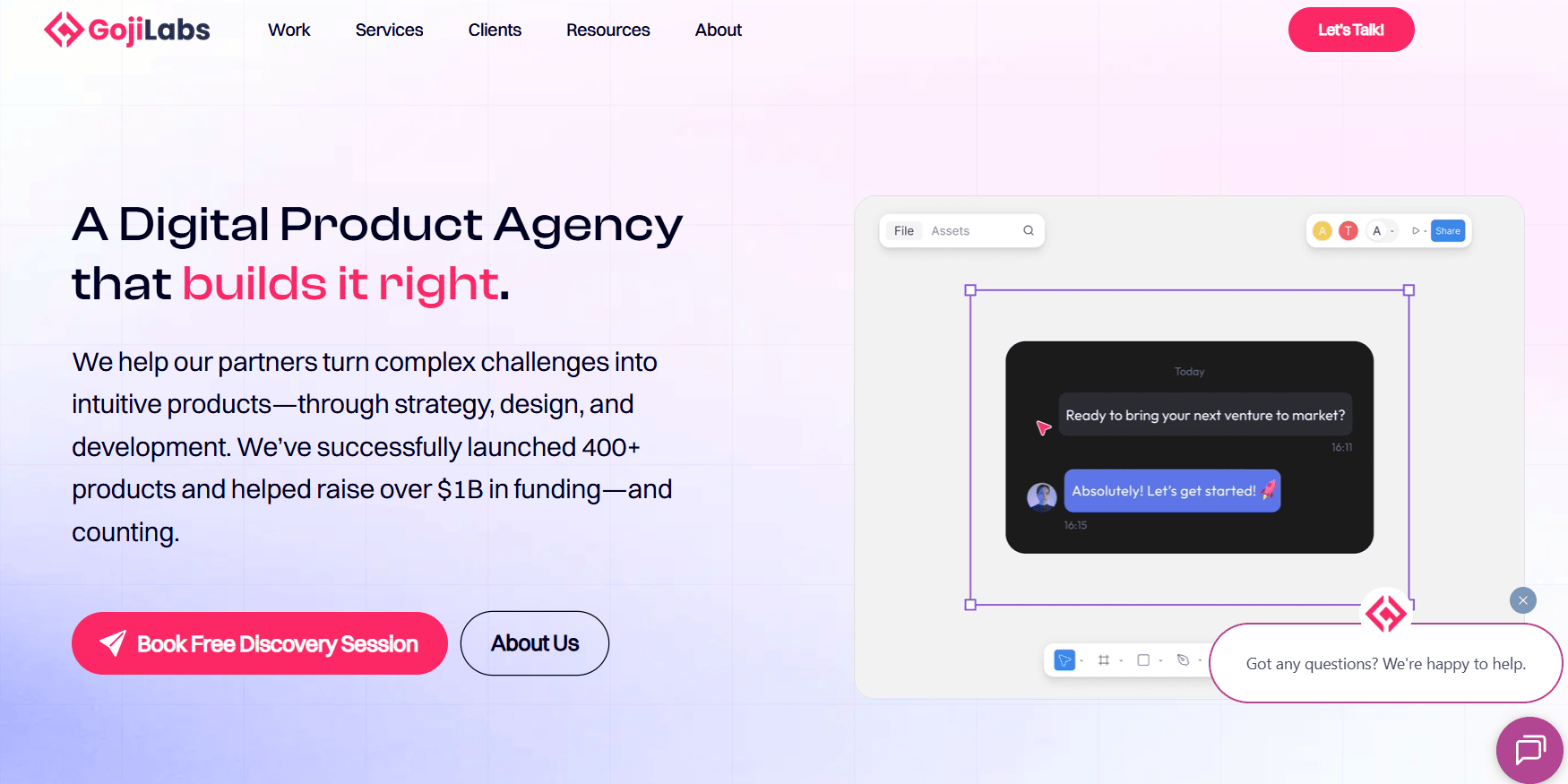
Goji Labs: User-Centered Product Development
Goji Labs has carved out a niche as a product-focused development studio that combines technical expertise with strong design sensibilities. Founded by software engineers with entrepreneurial backgrounds, they bring a founder’s perspective to client projects.
Their approach centers on user experience and business viability alongside technical feasibility – the classic product management triangle. This methodology has proven particularly effective for startups and growth-stage companies looking to build products that users actually want to use.
Goji Labs specializes in web and mobile application development, with particular strength in React, React Native, Node.js, and Python/Django. Their portfolio includes successful projects across healthcare, fintech, education, and marketplace platforms.
What clients appreciate most about Goji Labs is their collaborative process. They don’t just execute requirements – they actively participate in shaping the product vision and roadmap. Their team asks challenging questions that often lead to better solutions than what was initially conceived.
For organizations that need more than just code implementation – those seeking a true product development partner who can contribute to strategy and user experience – Goji Labs offers a compelling combination of technical skill and product thinking.

Orases: Rapid, Business-First Custom Software Development
Orases stands out for their speed, transparency, and exceptional service quality. Founded in 2000, this 100% U.S.-based development team has earned an impressive Net Promoter Score of 84 (far above the industry average of 17) and perfect 5.0 Clutch ratings.
What truly differentiates Orases is their confidence in delivery speed – they offer a money-back guarantee if clients feel they could have done better or faster. This bold promise reflects their streamlined development process and business-first approach.
Their service offerings cover the full spectrum of software development: AI & Machine Learning, Web and Mobile App Development, UI/UX Design, Testing & QA, and more. They’ve built particular expertise in creating custom solutions for business functions like ERP, CRM, SaaS platforms, e-commerce, and data visualization.
With nearly 950 clients served and a 96% retention rate, Orases has proven their ability to build lasting partnerships. The NFL Foundation praised them for creating a streamlined grant system, while clients across industries note they “go above and beyond” and “plug in seamlessly” to existing teams.
Headquartered in Frederick, Maryland, with offices in Washington D.C., Chicago, and New York, Orases maintains a consistent culture and values-driven approach. Their client-first model includes a free pre-project discovery phase and rapid prototype development, ensuring alignment before significant investment.
For organizations that value speed, transparency, and a business-focused approach to software development, Orases offers a proven track record of delivering results quickly without sacrificing quality.
How to Choose the Right Software Development Company
Selecting the perfect development partner requires a structured approach that goes beyond comparing feature lists or hourly rates. Here’s a practical framework to guide your decision:
Define your project scope and goals: Start by clearly documenting what you need built, your timeline, and your budget constraints. Be specific about must-have features versus nice-to-haves. Ask yourself: What business problem are we solving? What does success look like?
Identify your technical requirements: List the technologies your project requires. Does it need AI capabilities? Cloud architecture? Mobile apps? This will help narrow your search to companies with relevant expertise.
Evaluate technical expertise: Review case studies and client testimonials that demonstrate experience with similar projects. Ask potential partners about their approach to your specific technical challenges. Request code samples or architecture diagrams if appropriate.
Assess communication and workflow: How will the team communicate with you? What project management tools do they use? How frequently will you receive updates? Time zone alignment and language fluency are particularly important for distributed teams.
Check references thoroughly: Speak with at least 2-3 current or past clients. Ask specific questions: How did they handle challenges? Were deadlines met? Did the final product meet expectations? Was the budget adhered to?
Consider cultural fit: The best technical team won’t succeed if your working styles clash. Evaluate whether their communication style, values, and approach to problem-solving align with your organization.
Red Flags to Watch For:
- Vague or evasive answers about their development process
- Reluctance to provide client references
- Unusually low cost estimates compared to other quotes
- No clear quality assurance or testing processes
- High developer turnover (ask about their retention rates)
- Inability to explain technical concepts in understandable terms
Implementation Checklist:
- Establish clear communication channels and points of contact
- Define a detailed project plan with milestones and deliverables
- Set up regular progress reviews and feedback sessions
- Create a documented change management process
- Agree on testing procedures and acceptance criteria
- Plan for knowledge transfer and documentation
Trends in Software Development
The software development landscape continues to evolve rapidly, with several key trends reshaping how companies build and deploy applications:
AI Integration Becomes Standard: AI capabilities are no longer optional extras – they’re becoming core components of modern software. As experts at Orange Crew point out, businesses today expect applications to deliver automation, predictive insights, and intelligent decision-making out of the box. From chatbots and recommendation engines to fraud detection and workflow optimization, AI is reshaping how companies operate and how customers interact with digital tools. From intelligent data processing to predictive analytics and natural language interfaces, AI is transforming what users expect from applications. Companies like Azumo and Inexture are leading this shift by building AI expertise into their core development teams rather than treating it as a specialty service.
Low-Code/No-Code Platforms Complement Custom Development: The rise of low-code platforms isn’t replacing custom development – it’s changing how it’s approached. Smart development firms now build custom components that integrate with low-code platforms, creating hybrid solutions that combine the speed of low-code with the flexibility of custom code. This trend allows businesses to deploy solutions faster while maintaining the ability to add unique functionality.
DevSecOps Becomes Non-Negotiable: Security is shifting left in the development process, with security considerations integrated from day one rather than added at the end. The most forward-thinking development companies now include security experts on their teams who work alongside developers throughout the project lifecycle. This approach reduces vulnerabilities and compliance issues while speeding up deployment.
Microservices Architecture Dominates Enterprise Development: The monolithic applications of yesterday are giving way to microservices-based architectures that offer greater flexibility, scalability, and resilience. Development partners with experience in containerization, orchestration, and API-first design are becoming increasingly valuable as organizations modernize their application portfolios.
Sustainability Enters the Development ConversationEnergy-efficient code and sustainable development practices are emerging as important considerations, especially for cloud-based applications where resource usage directly impacts costs and carbon footprint. Leading development firms are beginning to include code efficiency and resource optimization as key quality metrics.
Frequently Asked Questions
How much does custom software development typically cost?
Custom software development costs vary widely based on project complexity, features, and the development partner you choose. Small projects might start around $50,000-$100,000, while enterprise-scale applications can range from $250,000 to several million dollars. Most development firms offer either time-and-materials pricing (paying for hours worked) or fixed-price contracts for well-defined projects. Nearshore options like Azumo often provide 30-40% cost savings compared to U.S.-based teams without sacrificing quality.
How long does it take to develop custom software?
Timeline depends on project scope and complexity. Simple applications might take 3-6 months from concept to launch, while complex enterprise systems can take 12+ months. Most reputable firms use agile methodologies that deliver working software in increments, allowing you to see progress and make adjustments throughout the development process rather than waiting for final delivery.
Should I choose a local or offshore development partner?
This depends on your priorities. Local partners offer face-to-face collaboration and cultural alignmen,t but typically at higher costs. Offshore teams provide cost savings but may present communication challenges due to time zones and language barriers. Nearshore options (like Latin America for U.S. companies) often provide a middle ground with time zone alignment and cultural compatibility at moderate costs.
What’s the difference between staff augmentation and dedicated teams?
Staff augmentation involves hiring individual developers to join your existing team, working under your management. Dedicated teams function as self-contained units with their own project management, typically working on specific projects or products. Staff augmentation gives you more direct control but requires strong internal technical leadership, while dedicated teams provide more independence but less day-to-day oversight.
How do I protect my intellectual property when working with external developers?
Always start with a strong contract that includes confidentiality provisions and clearly establishes ownership of all work products. Reputable development firms will readily sign such agreements. Consider breaking complex projects into modules so no single developer has access to the entire codebase. For highly sensitive projects, some companies use technical measures like private repositories with access controls.
What should be included in a software development contract ?
A comprehensive contract should include: detailed project scope and deliverables, timeline with milestones, payment terms and schedule, intellectual property rights, confidentiality provisions, quality standards and acceptance criteria, change management process, warranty period, and maintenance/support terms. Most disputes arise from poorly defined expectations, so clarity is essential.
How do I evaluate a development team’s technical skills?
Review their portfolio for projects similar to yours, ask technical questions specific to your project requirements, request code samples (with appropriate confidentiality measures), and consider a paid pilot project before full commitment. Some companies also conduct technical interviews with key team members who would work on your project.
Conclusion and Next Steps
Choosing the right software development partner is a critical decision that will impact your project’s success, timeline, and budget. The companies featured in this guide represent the best options for different needs and priorities in 2025:
For enterprise AI and data-driven applications with U.S. time zone coverage, Azumo offers an excellent balance of technical expertise and cost-effectiveness through their nearshore model.
If cutting-edge AI implementation is your priority, Inexture brings specialized expertise and a proven track record with major clients.
Organizations needing strategic guidance alongside development should consider ELEKS for their consulting-led approach.
For rapid deployment with guaranteed timelines, Orases stands out with their speed-focused methodology.
Your next steps should include:
- Identifying 2-3 potential partners from this list based on your specific needs
- Requesting initial consultations to discuss your project requirements
- Asking for relevant case studies and client references
- Comparing proposals with attention to approach, timeline, and pricing structure
Remember that the lowest bid rarely delivers the best value. Focus instead on finding a partner whose expertise, communication style, and development approach align with your project goals and organizational culture.
For complex projects, consider starting with a paid discovery phase to define requirements and architecture before committing to full development. This approach reduces risk and often leads to more accurate estimates and timelines.
Ready to start your software development journey? Contact any of these top-rated firms to discuss your project needs and take the first step toward bringing your vision to life.
Other Interesting Articles
Master the Art of Video Marketing
AI-Powered Tools to Ideate, Optimize, and Amplify!
- Spark Creativity: Unleash the most effective video ideas, scripts, and engaging hooks with our AI Generators.
- Optimize Instantly: Elevate your YouTube presence by optimizing video Titles, Descriptions, and Tags in seconds.
- Amplify Your Reach: Effortlessly craft social media, email, and ad copy to maximize your video’s impact.
The post List of the Top 7 Software Development Companies of 2025 appeared first on StoryLab.ai.


Deixe um comentário